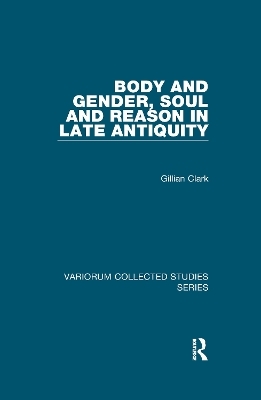
Body and Gender, Soul and Reason in Late Antiquity
Routledge (Verlag)
978-0-367-60224-6 (ISBN)
What does it mean to say that a human being is body and soul, and how does each affect the other? Late antique philosophers, Christians included, asked these central questions. The papers collected here explore their answers, and use those answers to ask further questions, reading Iamblichus, Porphyry, Augustine and others in their social and intellectual context. Among the topics dealt with are the following. Humans are mortal rational beings, so how does the mortal body affect the rational soul? The body needs food: what foods are best for the soul, and is it right to eat animal foods if animals are less rational than humans? The body is gendered for reproduction: are reason and the soul also gendered? Ascetic lifestyles may free our bodies from the limitations of gender and desire, so that our souls are free to reconnect with the divine; but this need must be balanced with the claims of family and society. Philosophers asked whether life in the body is exile for the soul; Christians defended their claim that body as well as soul would live after death, and even the smallest fragment of a martyr's body is proof of resurrection.
Until her retirement in 2010, Professor Gillian Clark was Professor of Ancient History at the University of Bristol, UK.
Contents: Preface; Part I Bodies and Minds: the Limits of Reason: The Fathers and the children; Cosmic sympathies: nature as the expression of divine purpose; The Fathers and the animals: the rule of reason?; Animal passions. Part II Bodies and Gender: Christian Challenges: Women and asceticism in late antiquity: the refusal of status and gender; 'The bright frontier of friendship': Augustine and the Christian body as frontier; Adam's womb (Augustine, Confessions 13.28) and the salty sea; Bodies and blood: late antique debate on martyrdom, virginity and resurrection; The old Adam: the Fathers and the unmaking of masculinity; Adam's engendering: Augustine on gender and creation; In the foreskin of your flesh': the pure male body in late antiquity. Part III Bodies and Souls: the Philosophic Life: Victricius of Rouen: Praising the Saints; Translating relics: Victricius of Rouen and 4th-century debate; Translate into Greek: Porphyry of Tyre on the new barbarians; Philosophic Lives and the philosophic life: Porphyry and Iamblicus; Fattening the soul: Christian asceticism and Porphyry On Abstinence; The health of the spiritual athlete; Do try this at home: the domestic philosopher in late antiquity; Addenda; Index.
| Erscheinungsdatum | 01.07.2020 |
|---|---|
| Reihe/Serie | Variorum Collected Studies |
| Verlagsort | London |
| Sprache | englisch |
| Maße | 150 x 224 mm |
| Gewicht | 453 g |
| Themenwelt | Geisteswissenschaften ► Philosophie ► Erkenntnistheorie / Wissenschaftstheorie |
| Geisteswissenschaften ► Philosophie ► Philosophie Altertum / Antike | |
| ISBN-10 | 0-367-60224-5 / 0367602245 |
| ISBN-13 | 978-0-367-60224-6 / 9780367602246 |
| Zustand | Neuware |
| Haben Sie eine Frage zum Produkt? |
aus dem Bereich

![Was heißt Denken?. Vorlesung Wintersemester 1951/52. [Was bedeutet das alles?] - Martin Heidegger](/media/113619842)
